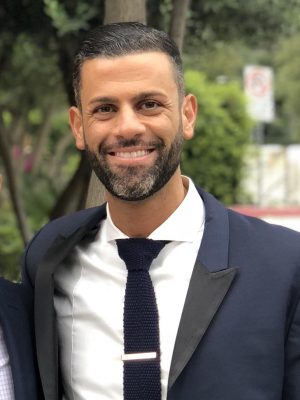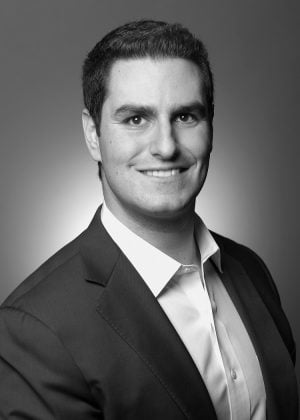alt.legal: Say 'Thanks Robots' As Ping Works To Automate The Billable Hour
Ping looks to take the hassle out of timekeeping.
 How about a sincere “thank you” to our emerging robot helpers, and badass companies like Ping (and its CEO Ryan Alshak) who are training them to make your lawyerly lives better.
How about a sincere “thank you” to our emerging robot helpers, and badass companies like Ping (and its CEO Ryan Alshak) who are training them to make your lawyerly lives better.
Having co-authored the alt.legal column for the past four years, I’ve heard a lot of robot-bashing from Biglaw, and I’m fed up. First, enough with the “they’re taking our jobs!” For the most part, y’all are doing fine, and we all know you just got sweet, sweet raises. Second, I love my robot helpers, so don’t lump your vitriol with Legal AI in with my Alexa, who is kind, noble and hardworking (you are a very good AI, Alexa). Finally, and I’m honestly asking here, are Biglaw jobs so awesome, that a little robot task acquisition couldn’t be beneficial?
Today’s column is about a humble AI, working to automate that most joyless of non-revenue-generating tasks: recording your billable hours. Ryan, and his company Ping, recently graduated from MDR Lab, a Silicon Valley-like tech accelerator within an amazing law firm, Mishcon de Reya, which I covered last month. Not only did the leader of MDR Lab encourage me to chat with Ryan, but my wonderful team lead in London, Maniti Barot, watched Ping’s demo at MDR Lab demo day, and was very impressed. I needed to know more!

Happy Lawyers, Better Results The Key To Thriving In Tough Times
Enjoy my interview with Ryan Alshak, former Biglaw associate and current father of a legal Artificial Intelligence who will appreciate a warm “Thank you!”
Joe Borstein: Ryan, great to meet you, and thanks for your work solving a core struggle of Biglaw, the billable hour. Tell me quickly about your background in law and now tech!
Ryan Alshak: I was a corporate litigator for three years and an awful timekeeper. I was one of those lawyers who spent hours at the end of each week trying to recall and enter time. I knew there had to be a better way.
I left the security of being a lawyer, partnered with the best technologists in the world, and Ping was born.
Sponsored

Law Firm Business Development Is More Than Relationship Building

Curbing Client And Talent Loss With Productivity Tech

How The New Lexis+ AI App Empowers Lawyers On The Go

AI Presents Both Opportunities And Risks For Lawyers. Are You Prepared?
JB: Let’s zoom in there a bit. You realized that billing was terrible (or you were terrible at it), but how did you come to YOUR solution? How did you even know it was feasible and what kind of team you needed to build it?
RA: The truth is I didn’t know it would be feasible when I took the plunge. But I completely trusted my co-founders and knew we would figure it out.
We recognized we needed to account for lawyers’ time on and off a computer and give context to that time. It’s not enough for a lawyer to have a ledger of their day, they need context for example: was it billable, which client/matter was it for, what’s the description of that time, what legal code was it, and, of course, how long did it take?
JB: But how do you actually achieve billable automation, and what has been the reaction from the greatest victims of the billable hour, associates!
RA: We obsess over eliminating the friction of timekeeping. There is no reason why it should take just as long to log work as it does to perform the work in the first place. Our design motto is “less clicks.”
Sponsored

AI Presents Both Opportunities And Risks For Lawyers. Are You Prepared?

Happy Lawyers, Better Results The Key To Thriving In Tough Times
In terms of automation, we plug into systems lawyers use to perform billable work and we leverage machine learning to build a complete timesheet. So, a lawyer works exactly as they are now, and Ping captures, categorizes, describes and codifies it automatically. The lawyer just needs to review and release.
Our first user, Charlie Rawson, told us that he can never go back to the old way of timekeeping. Another associate, Charlotte Davidson, told us she’d rather us take her arm than Ping (I think Char was a thespian in a previous life).
The biggest problem we had in our initial Mishcon de Reya rollout was users demanding from firm management that Ping not be uninstalled after the pilot period ended. This made us smile.
JB: Tell us more about your experience at Mishcon and their MDR Lab, which I covered in my last article?
RA: We executed on a very successful pilot that contributed to a 13 percent revenue lift for our users.
Most of a partner’s workday is now spent living in email and on the phone. When you have such a high volume of traffic, it is impossible to log each entry. It’s the drinking out of a firehose euphemism.
We are a tool for the lawyer. Users may decide not to bill certain client work, but Ping makes that a lawyer’s affirmative decision — not a function of how miserable timekeeping is.
And an accurate ledger gives the firm, the lawyer, and the GC accurate data. This is our biggest value add in my opinion. With inaccurate time entries comes inaccurate budgeting which drives clients crazy. But with clean data comes increased predictability and transparency which is what clients want more than anything else. This is how Ping becomes a win-win-win for the lawyer, firm, and client.
JB: So when pushed (and I had to push him) Nick West of MDR Labs said that if I were to cover just one MDR Lab company this year, it would be Ping. Tell our readers a little more about your experience.
RA: In an unrelated note, remind me to complete my Venmo to Nick.
MDR Lab was an inflection point for us. Not only we did we validate our hypothesis when it came to what lawyers and firms are looking for, but it also exposed us to many stakeholders (IT, finance, cybersecurity, etc.) that we hadn’t truly accounted for.
Mishcon is an innovative firm and a truly special place. We couldn’t have asked for a better early customer.
JB: So you have admitted that you needed an amazing team to build Ping. I think a lot of lawyers know how to find problems with the practice of law that need fixing (alt.legal companies) but few have any idea how to build and staff a team to solve them! Tell us about that experience.
RA: Team building is the most difficult part of any company. If you nail it, you win. If you don’t, you are swimming with the fishes. The truth is I got lucky. My friends just happen to be some of the brightest technologists in the world (I’m a big believer of the five chimps theory). We have gone through the ringer to build trust, respect, and admiration for one another.
I would tell any person who has an idea they believe in to: 1) make sure they are building it because they can’t imagine doing anything else and 2) choose partners who will be in the foxhole with you and are obsessed with the problem you are solving. Everything else will fall in line.
JB: OK, let’s get a little bigger picture for our alt.legal fans. What do you think of this moment in time in Legal Tech? Is this just a blip on the radar, or the harbinger of bigger changes to come?
RA: In five years, we won’t consider tech an industry, it will be the foundation that every industry is built on. Legal is no different.
This moment in legal tech is a watershed one. While we’ll still deal with conversations that will never age well (on-prem v. cloud for example), the current wave of legal tech companies will change the way legal services are fundamentally priced, delivered, and evaluated.
JB: Thanks Ryan! Very interesting, and we’ll be following you and your company in the exciting times to come.
 Joe Borstein is a Global Director with Thomson Reuters Legal Managed Services, delivering Pangea3 award-winning legal outsourcing services and employing over 1800 full-time legal, compliance, and technology professionals across the globe. He and his co-author Ed Sohn each spent over half a decade as associates in BigLaw and were classmates at Penn Law. (The views expressed in their columns are their own.)
Joe Borstein is a Global Director with Thomson Reuters Legal Managed Services, delivering Pangea3 award-winning legal outsourcing services and employing over 1800 full-time legal, compliance, and technology professionals across the globe. He and his co-author Ed Sohn each spent over half a decade as associates in BigLaw and were classmates at Penn Law. (The views expressed in their columns are their own.)
Joe manages a global team dedicated to counseling law firm and corporate clients on how to best leverage Thomson Reuters legal professionals to improve legal results, cut costs, raise profits, and have a social life. He is a frequent speaker on global trends in the legal industry and, specifically, how law firms are leveraging those trends to become more profitable. If you are interested in entrepreneurship and the delivery of legal services, please reach out to Joe directly at [email protected].







